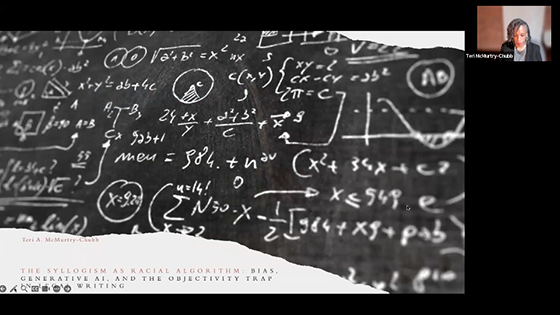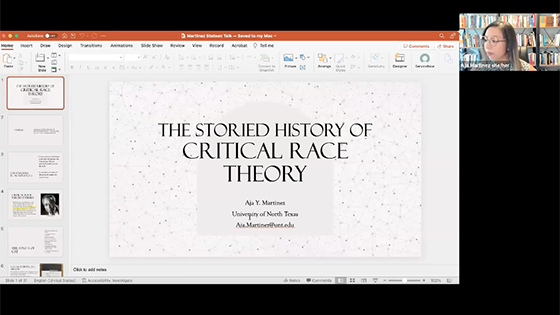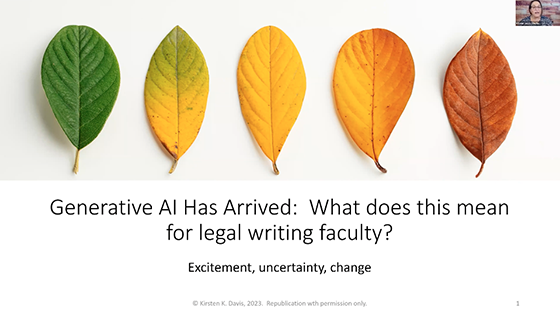Institute for the Advancement of Legal Communication
Webinars and Videos
The Institute for the Advancement of Legal Communication makes legal communication training and education available online by recording its speakers and workshops and by hosting Virtual Legal Writing Conference Webinars.
Exploring the Contours of the Discipline Webinar Series
Bias in Generative AI
October 2023
Episode 3 of the Exploring the Contours of the Discipline Webinar Series was hosted by Stetson's Institute for the Advancement of Legal Communication on Friday, October 27, 2023. In Episode 3, Teri A. McMurtry-Chubb presented on the biases inherent in generative AI and other artificial intelligence technologies and offered strategies for how to combat those biases as these technologies become more prevalent in the legal and academic fields. Teri is a Professor of Law at the University of Illinois Chicago, and she has published numerous articles and books throughout her career. She researches, teaches, and writes in the areas of critical rhetoric, discourse and genre analysis, and legal history. Teri is nationally renowned for her work supporting the dismantling of structural discrimination in educational institutions and the workplace, and she is a leader in designing curricula to facilitate diversity, equity, and inclusion efforts. Teri is also the first person of color to serve as President of the Association of Legal Writing Directors (ALWD), the former chair of the LWI Diversity Initiatives Committee, and the 2021 Blackwell Award winner.
Counterstory: The Writing and Rhetoric of Critical Race Theory
September 2023
Episode 2 of the Exploring the Contours of the Discipline Webinar Series was hosted by Stetson's Institute for the Advancement of Legal Communication on Friday, September 22, 2023. In Episode 2, Dr. Aja Martinez spoke about Counterstory: The Writing and Rhetoric of Critical Race Theory. Through story, participants were led through archival research conducted within CRT founder Derrick Bell’s papers and oral histories conducted among CRT founders, such as Richard Delgado and Jean Stefancic. Together we reviewed literatures, correspondence, and media documentation to explore the CRT origins story demonstrating how immensely human CRT is, with a beating central heart dependent on story and a storytelling tradition. The talk illustrated that CRT is not merely a brand, but an idea imbued with theory, methodology, and pedagogy.
Dr. Martinez is an Associate Professor of English at University of North Texas. As noted on her bio, "[h]er scholarship, published nationally and internationally, makes a compelling case for counterstory as methodology through the well-established framework of critical race theory (CRT)." She authored the multi-award-winning book Counterstory: The Rhetoric and Writing of Critical Race Theory and co-authored On the Importance of Critical Race Theory—and the Delusional Attacks On It with Richard Delgado and Victor Ray. Read more about her scholarship and other projects.
Generative AI and Legal Writing: What to Know Right Now
August 2023
Episode 1 of the Exploring the Contours of the Discipline Webinar Series was hosted by Stetson’s Institute for the Advancement of Legal Communication on Friday, Augsut 4, 2023. In Episode 1, Dr. Kirsten Davis presented on Generative AI, which was just knocking on our door. In this webinar, Dr. Davis explained how generative AI, like ChatGPT, works, examined its risks and opportunities for legal writing, and provided a framework for thinking about the critical questions that face legal writing faculty.
Kirsten Davis is a Professor of Law and Faculty Director of Online Legal Education Strategies at Stetson University College of Law. She has a JD from The Ohio State University Moritz College of Law and a PhD in Human Communication from the Hugh Downs School of Human Communication at Arizona State University. At Stetson, she founded the Institute for the Advancement of Legal Communication. For more than two decades, she has taught courses in legal writing, legal ethics, law and rhetoric, and the First Amendment.
Virtual Legal Writing Conference Webinars
Since 2009, Stetson's Virtual Legal Writing Conference Webinars have attracted more than 250 attendees for the live events. Topics have included outcomes and assessments in legal writing, coaching moot court teams, advanced writing course innovations, the definition of "legal writing scholarship," technology for giving feedback, and new ideas and voices in legal writing scholarship. Archived presentations are available below.
Designing the Persuasive Writing Problem: Appellate Briefs and Trial Memoranda
November 2013
Designing an effective and enjoyable trial or appellate brief problem is a difficult but rewarding task. Join Sarah Ricks and Kirsten Davis as they discuss the steps of designing trial and appellate brief problems and delve into the challenges and joys of this core component of teaching legal writing. Topics include finding problem ideas, selecting learning outcomes and tailoring the problem to them, handling open and closed problem design, timing the oral argument as part of the design process, and more. Faculty new to problem design as well as those with experience will enjoy this session.
Teaching the Basics of Tribal Law in
First-Year Legal Research and Writing:
Improving Knowledge and Skills, Promoting
Inclusiveness and Diversity
September 2012
Given the geographic scope of Native American nations, the value of their business dealings, and the existence of their separate laws and legal systems, today's lawyer may encounter tribal law at some point in his or her practice. Our speakers for this webinar are LRW faculty who are known for their expertise in teaching and studying tribal law and tribal law research. They will introduce you to tribal law basics, show you some sources for researching that law, and give you strategies for incorporating tribal law and tribal law research into a first-year research and writing course.
Supporting Materials:
- Tribal Law Basics for LRW Bibliography
- United States Courts System Chart
- Sources of Law
- LARW and Tribal Law
- Facts About Tribal Courts
Live Commenting and Grading
February 2012
Giving oral feedback instead of written comments on student papers is a pedagogical method gaining traction within the legal writing community. Not without its detractors, the method boasts the positive attributes of efficiency, timeliness, interaction, and enhanced learning. The speakers for this webinar are experienced users of the live commenting and live grading method. They will describe how they prepare for and execute the method, the method's pros and cons, limitations to the method, and responses to fears about using the method.
Diversity in the Legal Writing Classroom November 2011
Many legal writing professors recognize the importance of incorporating diversity issues and multicultural topics into their classes, but doing so effectively requires additional consideration to appropriately address sensitive topics and student resistance, and to promote among other faculty members the practice of teaching in a more explicitly inclusive manner. This webinar will introduce suggestions for addressing these concerns and successfully incorporating diversity issues and discussion into your course.
Empirical and Statistical Studies in Legal Writing
October 2011
Empirical studies of legal writing, including rigorous statistical studies, are a relatively fertile yet largely unexplored area of scholarship for legal writing faculty. For this webinar, faculty who have successfully published empirical scholarship in legal writing and related areas will explain the fundamentals of writing an empirical piece, and statisticians will describe the advantages of consulting with or even co-authoring with a statistician. Join us for a discussion on how to approach an empirical project, even if you have little or no experience with statistics or other empirical methodologies.
Outcomes and Assessment in Legal Writing October 2010
Professors Susan Duncan, Victoria VanZandt, and Melissa Weresh are leading the way in studying and implementing outcomes and assessment in legal writing specifically and in the law school curriculum more generally. Join us to hear them discuss outcomes and assessment in legal writing, including course mapping and curriculum mapping.
Scholarship Highlights: New Voices and New Ideas in Legal Communication
April 2010
Every year, excellent scholarship is written by faculty who are committed to researching and teaching effective legal communication. During this webinar, three legal writing faculty discuss their currently published and ongoing scholarly projects in the area of legal communication--one empirical, one pedagogical, and one doctrinal. We invite you to join us to learn more about the continued scholarly development of our discipline, to ask questions of the authors about their projects, and to share your ideas about the most pressing questions in legal communication today.
Using Technology to Comment on Papers
March 2010
Commenting on papers is one of the most, if not the most, important aspect of personalized instruction in the legal writing curriculum. Yet, it is also a time-consuming and tedious task, which has caused legal writing faculty to explore ways to make commenting both more effective and more efficient. During this webinar, two legal writing faculty will discuss and demonstrate how they have improved their commenting--both written and oral--by using technology.
What is "Legal Writing Scholarship"?
February 2010
As our discipline matures, the question of "What is Legal Writing Scholarship?" becomes more salient. What does it mean to write in the area of "legal writing"? And, what does our choice about that definition mean to the development of our disciplinary identity? During this webinar, three legal writing faculty will talk about their answer to the question, "What is Legal Writing Scholarship?"
Innovations in Upper-Level Legal Writing Courses
November 2009
Attracting students to upper-level writing courses and engaging those students in the classroom and on assignments can be challenging. In this session, we hear from faculty who have successfully experimented with new ways to design and teach upper level courses that have a significant writing component. Hear about combining upper level writing skills with doctrine and advocacy competitions, designing condensed legal drafting courses that have practitioners as co-teachers, and, in an advanced writing course, using a unique "capstone" assignment that focuses on non-legal audiences.
Strategies for Coaching Moot Court Teams
October 2009
Many legal writing faculty, as part of their law school service, coach moot court teams. But, success does not come easy in the world of competitive oral advocacy. This session features successful moot court coaches sharing their strategies for preparing law students for moot court success.
Designing the First-Year Legal Writing Curriculum: Outcomes and Assessment
September 2009
In response to the Carnegie Report and increased focus by the ABA and regional accrediting agencies on student outcomes and their assessment, law schools across the country are exploring how to re-focus curriculum on student learning outcomes and how to assess those outcomes. This session explores how to develop outcomes, and how to incorporate them into the first year legal writing curriculum, at the program level and the course level. The session also provides ideas about developing assessment tools that are useful to students and faculty to determine whether students are meeting the expected outcomes.


